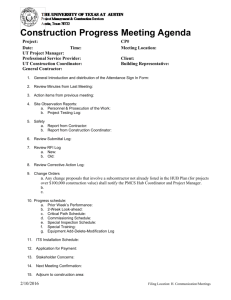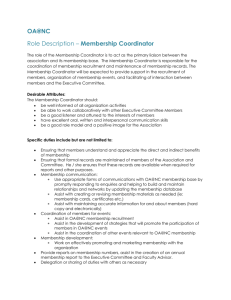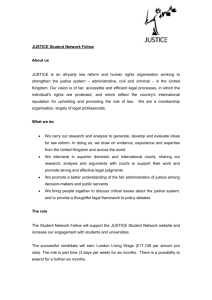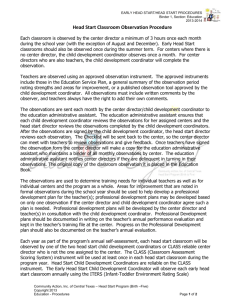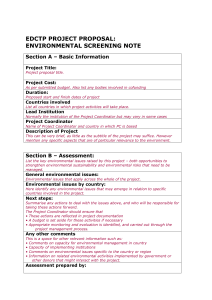Individual Community School Award for Excellence Dear Friends
advertisement
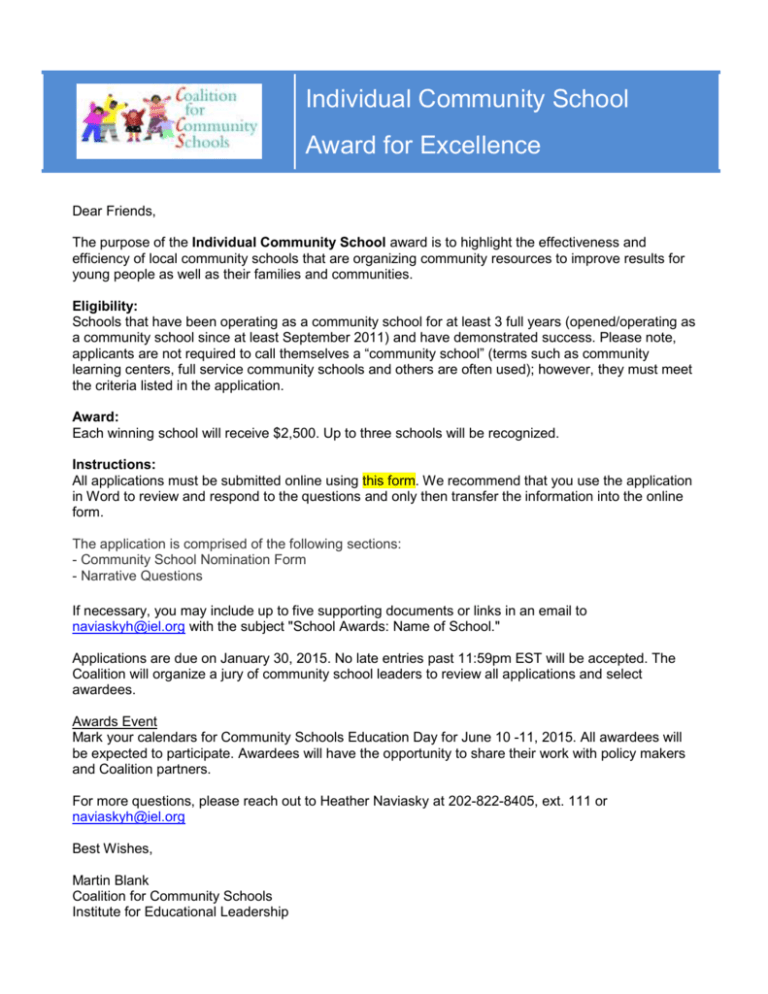
Individual Community School Award for Excellence Dear Friends, The purpose of the Individual Community School award is to highlight the effectiveness and efficiency of local community schools that are organizing community resources to improve results for young people as well as their families and communities. Eligibility: Schools that have been operating as a community school for at least 3 full years (opened/operating as a community school since at least September 2011) and have demonstrated success. Please note, applicants are not required to call themselves a “community school” (terms such as community learning centers, full service community schools and others are often used); however, they must meet the criteria listed in the application. Award: Each winning school will receive $2,500. Up to three schools will be recognized. Instructions: All applications must be submitted online using this form. We recommend that you use the application in Word to review and respond to the questions and only then transfer the information into the online form. The application is comprised of the following sections: - Community School Nomination Form - Narrative Questions If necessary, you may include up to five supporting documents or links in an email to naviaskyh@iel.org with the subject "School Awards: Name of School." Applications are due on January 30, 2015. No late entries past 11:59pm EST will be accepted. The Coalition will organize a jury of community school leaders to review all applications and select awardees. Awards Event Mark your calendars for Community Schools Education Day for June 10 -11, 2015. All awardees will be expected to participate. Awardees will have the opportunity to share their work with policy makers and Coalition partners. For more questions, please reach out to Heather Naviasky at 202-822-8405, ext. 111 or naviaskyh@iel.org Best Wishes, Martin Blank Coalition for Community Schools Institute for Educational Leadership COMMUNITY SCHOOL NOMINATION FORM Screening Criteria The Coalition for Community Schools encourages nominations from any school that meets the selection criteria outlined below. Schools are not required to call themselves a “community school” (terms such as community learning centers, full service community schools and others, are often used); however, they must meet the criteria below. *Note: past award winners may not apply again Are you a Community School? (All boxes must be selected to be considered for the award) A set of desired results drives the work of the school and its community. Partnerships are in place with one of the following: government agencies, institutions of higher education, faith-based organizations, community-based organizations, and/or parent/family groups. A coordination mechanism, ideally a full-time community school coordinator, is in place to guide the work of the community school. (Note: community school coordinators may also be referred to as – site coordinators, resource coordinators, etc.) A site-based leadership team that includes key stakeholders: the principal, the community school coordinator, teachers, families, residents, and community partners is in place. The community school has been operating for a minimum of 3 years. School Information (Please fill in the following information) School Name & Address School Name Address City State Zip Telephone Email Address Date Started as Community School (Month/Day/Year) Principal Information Principal’s Name Telephone Email Address Coordinator Information Coordinator’s Name Coordinator’s Title Coordinator’s Employer (e.g. school, community organization, or both) Coordinator’s Telephone Coordinator’s Email Address Nominating Individual (if different from above) Name Position Organization Telephone Email Address School Profile (Please fill in the following information) Type of School Regular Public School Public Charter School Magnet School Alternative School Other, please specify Grade Levels (please check all that apply) Pre K or younger K 1 2 3 4 5 6 7 8 9 10 11 12 12+ Location of School (Please select the description that best fits your school) Urban Suburban Rural Number of Students in the School Percentage of Students by Racial Background African American Asian Caucasian Hispanic Native American Other Percentage of ELL Students Percentage of Special Education Students Does Title I support your Community School? Title I school wide Title I targeted No Title I Percentage of Students Eligible for Free or Reduced Lunch Student Mobility Rate (based on your local or state definition) Total number of Languages Spoken. Please also list your top 5 languages spoken. NARRATIVE QUESTIONS, The following is an outline of the rubric that will be used to evaluate your application. Use the Coalition’s framework for Scaling Up Community Schools as background as you complete your application. - Results (30 points) - Alignment with Core Mission of the School - Engaged Instruction and Expanded Learning Opportunities (15 points) - Commitment to Equity (10 points) - Public and Private Partnerships (10 points) - Family and Community Engagement (10 points) - Coordination (10 points) - Finance and Sustainability (15 points) Elevator Speech Community schools are vehicles that enable schools and communities to connect, collaborate, and get better results for their young people. Children gain access to enriching learning opportunities and supports they need and deserve, and families and the community are engaged. Communities and schools leverage their shared physical and human assets to help students succeed. Please find our full definition, here! With this in mind, please tell us your elevator speech for your community school. What are the top three things you would want to highlight? If selected, this description will be used in related materials. (Max 300 characters) Results (30 points) Description: The community school has identified the results it seeks to achieve and the indicators it will use to measure progress toward those results (a results based framework). The community school demonstrates progress toward achieving these results. We are interested in improved results for students (academic, social, emotional, physical, and civic) as well as for families and the community over time. What results are you seeking? How does the process of selecting results work? How are educators and community partners aligning their efforts to achieve the desired results? What progress have you made moving the needle on the results you want to see? Think about the results you want to see at the student, family, and community levels. Please be as specific as possible (e.g. changes in reading and math scores, parent involvement, improved health, numbers of students participating in summer learning), and be sure to talk about the results at each level. Alignment with Core Mission of Schools - Engaged Instruction and Expanded Learning Opportunities (15 Points) Description: The school improvement plan (SIP) reflects the results that educators and community partners seek. It includes a strategy to support academic instruction through partnerships, and expand learning opportunities beyond the school day and in summer that are well integrated with the curriculum. Learning focuses on real world issues. It employs project base learning and connects students with internships, service learning, and/or community based projects. Teachers work in tandem with the coordinator and partners. Please describe how your SIP aligns partnerships with the school’s core curriculum. Discuss the relationship between partners and teachers. Commitment to Equity (10 Points) Description: Community schools go above and beyond to make sure all students, especially our most vulnerable, have equitable access to good teachers, a strong curriculum, and the other supports they need to succeed. They have developed a purposeful strategy that addresses other factors such as, inequities in suspensions and expulsions, health access, and availability of highly qualified teachers. What steps is your school taking to address specific inequities in your school and community that diminish student’s chances for success? Public and Private Partnerships (10 Points) Description: The community school has developed purposeful and effectively managed partnerships with other organizations (e.g., local government, community based organizations, faith-based organizations, higher education institutions, businesses, etc.) that are well-integrated in the life of the school. How many partners do you have? Please list your partners. Describe your approach to integrating partners into the school. Describe two of your most active partners and explain what opportunities and supports they provide to your school, and what results they are seeking. Family and Community Engagement - (10 Points) Description: The school is engaged in systematic efforts to involve, engage and collaborate with families and its community. Tell us what methods you are using to engage families more deeply in the education of their children. Describe both their involvement in decision making about the community school as well as particular programs. Coordination (10 Points) Description: A strategy for coordinating the work of educators and community partners is in place. It typically includes: School Site Leadership Team: Families, Principals, teachers, community residents, and community partners are involved in decision making at the community school. This School Site Leadership Team allows leaders in community schools to define shared results they seek and jointly develop strategies and programs to achieve them. Please review the Collaborative Leadership Structure here. Community School Coordinator: Responsible for creating, strengthening, and maintaining connections between the school and community. Coordinators facilitate and provide leadership for the collaborative process and for the development of a continuum of opportunities and supports for children, families and community members. Ideally, but not always, the coordinator is a full-time staff member. The coordinator is a core member of the school’s leadership team. Describe the key functions and elements of your School Site Leadership Team. Name at least one key challenge it has addressed successfully. Describe teachers’ roles and work of the community school coordinator. Highlight their relationship with the principal and partners and describe their key accomplishments. Finance and Sustainability (15 Points) Description: The school has the leadership, resources and policies in place to sustain the community school strategy and supports. How is your community school financed? Include and identify school, community, in-kind, philanthropic and other sources you use. How will your community school be sustained? (e.g. financially, politically) Other Information: If there is anything else you would like the reviewers to know about your community school, please tell us below. You may use this space to include links to relevant documents. If necessary, you may include a total of up to five supporting documents in an email to naviaskyh@iel.org with the subject "School Awards: Name of School"
